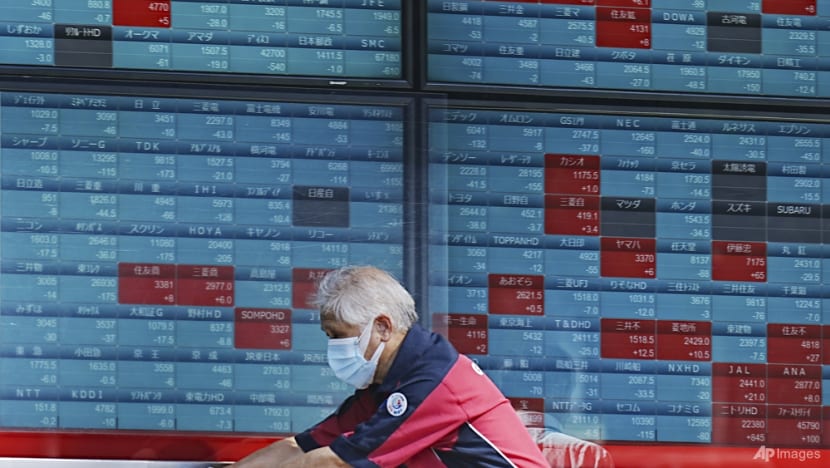Asian markets can recover and rise further despite volatility: Analysts
"There's still a case for investors to stay invested and remain medium-term positive," says one observer after a major sell-off in stocks this week.


This audio is generated by an AI tool.
SINGAPORE: Stock markets in Asia can recover and remain resilient in spite of volatility, observers said following a sell-off in the first week of September.
Besides, interest rate cuts in the United States could support equity markets, and global growth has not collapsed, they added.
"US economic data has provided comfort that while activity is slowing, it is not stalling," said Mr James Cheo, chief investment officer for Southeast Asia and India at HSBC Global Private Banking and Wealth.
"Tech companies are delivering strong earnings, and markets have come to realise that the Bank of Japan will be quite slow in its tightening process.
"Once the volatility subsides, we think global and Asian equities can recover on the back of earnings growth, rate cuts and high cash balances that can be put to work," he told CNA.
His comments came after Asian markets declined sharply on Wednesday (Sep 4), triggered by factors such as weak US manufacturing data and shares of artificial intelligence chip giant Nvidia tumbling 9.5 per cent on Tuesday.
Mr Cheo added that global equity markets are expected to trade higher in the next six months, with economic growth supportive and the US economy appearing to be headed for a soft landing rather than a recession.
"The global equity rally is likely to expand further beyond the US and Big Tech due to supportive drivers of broadening earnings growth," he said.
Mr Vasu Menon, managing director of investment strategy at OCBC, also said it looks like the US will avoid a recession or at worst, experience a short and shallow one.
"All in, there's still a case for investors to stay invested and remain medium-term positive," he said.
Stock valuations are not excessively high, especially for non-tech stocks, and rate cuts by the US Federal Reserve System could even support equity markets if there is no economic or earnings recession in the US, he added.
SEPTEMBER SELL-OFF
The Asian markets posting large losses on Wednesday included Japan's Nikkei 225 (more than 4 per cent) and South Korea's Kospi (more than 3 per cent).
In Singapore, the Straits Times' Index slipped 1.12 per cent.
On Thursday and Friday, stocks in Asia mostly traded lower, though with smaller losses than on Wednesday.
Mr Cheo said Asian markets fell in tandem with those in the US due to concerns that a slowing US economy would affect Asia's growth.
The triggers were similar to those that led to a pullback in August, including fears of a recession in the US and concerns over valuation of tech stocks, he said.
The adage "when the US sneezes, the world catches a cold" is highly relevant here, said Mr Chen Jingwei, chief investment strategist of wealth management platform Wrise Private Singapore.
Pointing to the global economy's interconnectedness in terms of supply chains and financial markets, he added: "The synchronised downturn in both US and Asian markets highlights how global investor sentiment has shifted, with a move toward safer assets like government bonds and investment-grade credit."
Nvidia alone, along with expectations of a rate cut in the US, are also significant forces in the market, said Mr Chen.
The analysts also pointed out that September has historically been a volatile month for stocks, with Mr Cheo noting that the month has recorded the biggest stock market corrections over the years.
This year, investors also have two major events to deal with, besides the US jobs report on Friday, Mr Menon added.
He pointed to the debate between presidential candidates Donald Trump and Kamala Harris on Sep 10 ahead of a November election, and a Fed meeting a week later on Sep 17.
OPPORTUNITIES IN SECTORS, MARKETS
Meanwhile observers said that tech sector still has long-term potential, even if it might have been hit harder in recent times.
"We maintain a bullish outlook on generative (artificial intelligence) and Nvidia," said Mr Chen of Wrise Private. "Strong demand from servers and AI remains intact, and we continue to view market dips as buying opportunities."
He also said defensive sectors like real estate, utilities, and consumer staples appear more resilient in a lower interest rate environment.
Mr Cheo of HSBC said the bank continues to favour the tech sector as well, but wants to increase exposure to others such as US industrial stocks.
The bank wants to reduce holdings of consumer discretionary stocks to reflect the growth slowdown, as well as headwinds from the price war in electric vehicle and auto sectors.
Broadly, Asia's economic engine benefits from structural trends, AI-driven innovation and an investment boom fueled by supply chain revamps and green transformation, he said.
"We favour equities in Japan, India and South Korea to capitalise on their growth trends, as well as corporate governance reform winners in select markets," Mr Cheo added.
OCBC's Mr Menon said India's large economy and young population could see more upside in its market.
The economy there is driven by domestic demand, and India could benefit as companies try to diversify their operations away from China.
"We are also positive on the Singapore bourse where valuations are relatively cheap, and the market offers lots of yield opportunities for those in search of income," he said, adding that real estate investment trusts or REITS are expected to perform better when interest rates fall.










.jpg?itok=d-0LVcdP)





